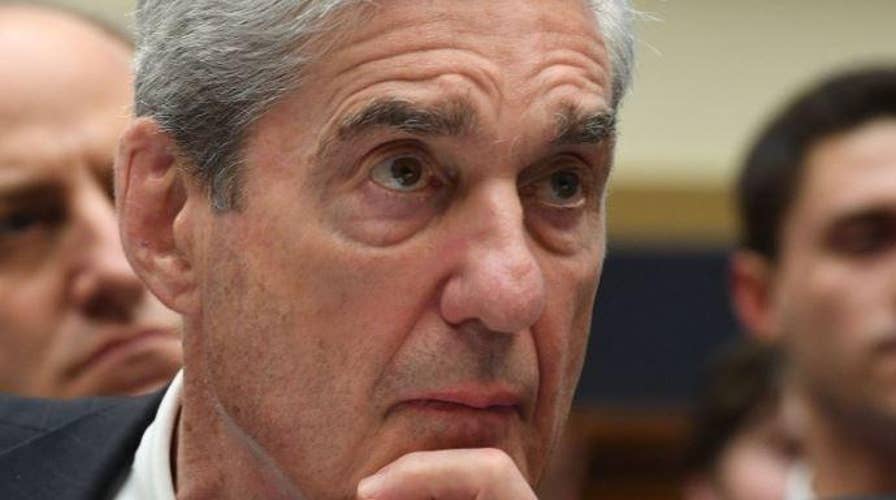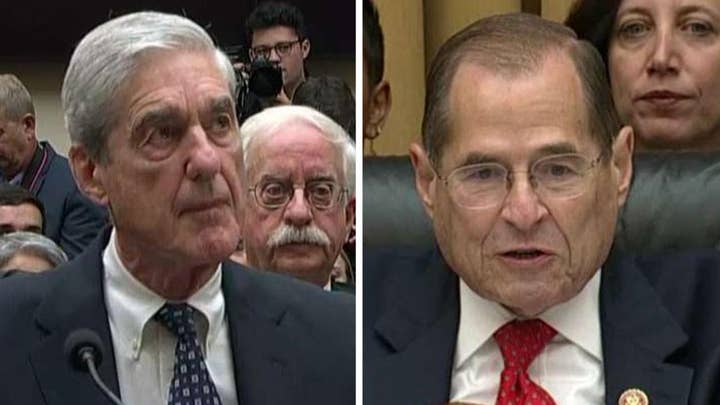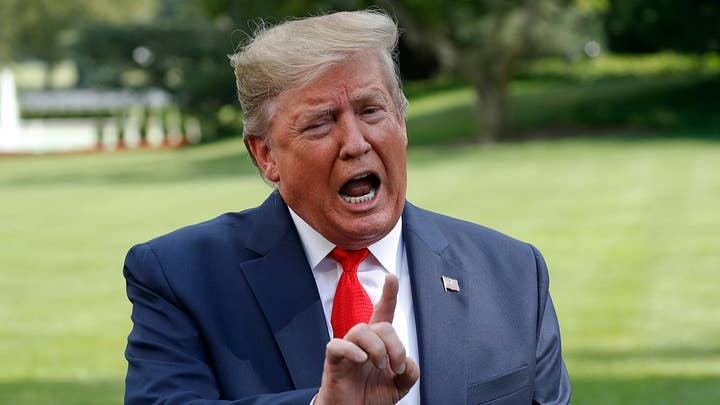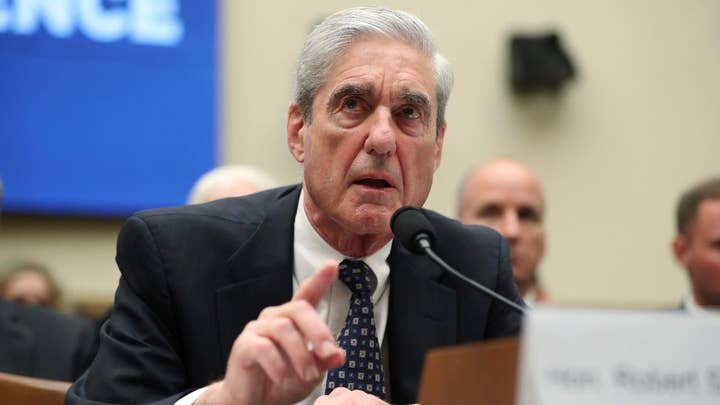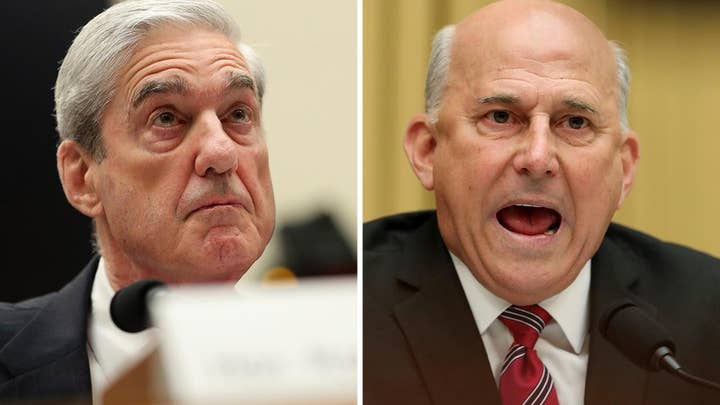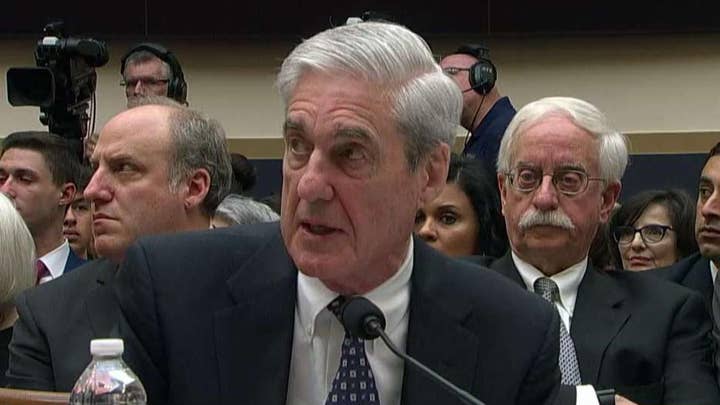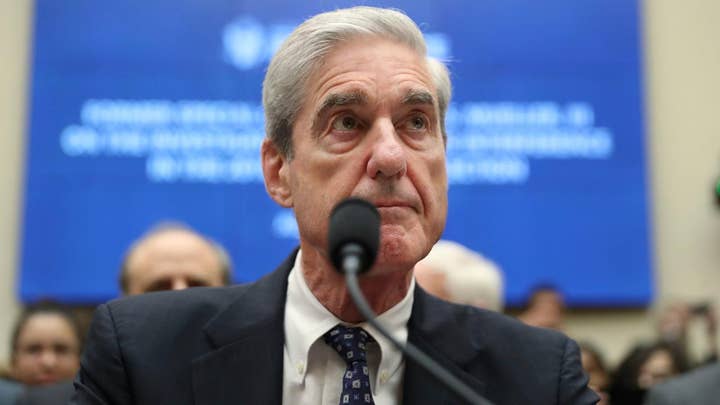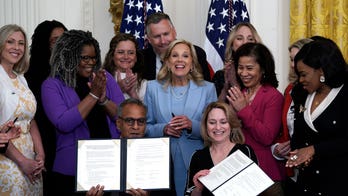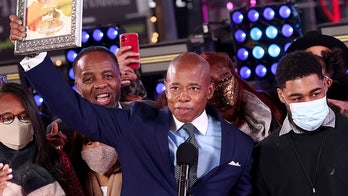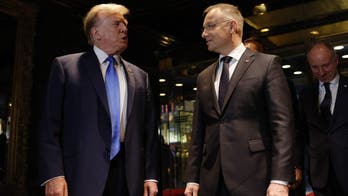Biggest moments from Robert Mueller's testimony before House Intelligence Committee
A look at some of the biggest moments from Robert Mueller's testimony before House Intelligence Committee.
Former Special Counsel Robert Mueller delivered long-awaited testimonies in front of two House committees Wednesday and submitted to nearly eight hours of questioning regarding his summary report of the nearly two-year investigation into Russian interference in the 2016 election and related matters.
In his opening statement to the House Judiciary Committee, Mueller warned Democratic and Republican lawmakers that his "testimony will necessarily be limited," and thus he would not discuss details of the FBI's Russia investigation, the Steele Dossier or the actions of Attorney General William Barr.
On numerous occasions, Mueller either directed committee members to the report or said "I'm not going to discuss that," "I can't answer that," "I'm not certain I would adopt that characterization," or "That's out of my purview." He also refused to read from the report himself and gave one-word answers to a number of questions or attempts at clarification, saying "yes," "no," "true," or "correct" throughout his testimony.
Here are five moments from Mueller's testimony that stood out.
1. Mueller's shaky performance and lack of command over subject matter raised questions about who really ran the probe
Democrats hoping to see a smooth, career lawman in command of facts and skilled at parrying with GOP House members had to be sorely disappointed. Mueller was described afterward by various pundits as "dazed," "doddering" and "confused." He asked for questions to be repeated scores of times, didn't appear to know who Fusion GPS, the firm that commissioned the Steele dossier at the center of the Russia probe, was and even got confused over which president first appointed him to be a United States Attorney.
He also had to come back in the afternoon to clarify a statement he made in the morning that at first had appeared to be a bombshell. Under questioning by the House Judiciary Committee, he had appeared to say his report had uncovered evidence of obstruction that could lead to the indictment of President Trump after he leaves office. Then, he had to come back in the afternoon prior to testimony to the House Judiciary Committee and say that his team did not make any determination as to whether President Trump committed obstruction of justice.
Mueller's clumsy, low-energy performance and failure to demonstrate knowledge of his own team's report prompted speculation that he was more of a figurehead than a boss during the probe.
"What I don't think anybody expected was Mueller would present himself as doddering, as lacking command of anything to do with the election and thereby raising a whole host of questions about who actually was in charge of this Mueller investigation," The Federalist's Mollie Hemingway told Fox News' "Special Report" Wednesday night. "A lot of people just gave it leeway because they respected him and seeing today I don't think anyone thinks he was in charge.
"It had been previously reported that 13 of his 17 associates were Democrats, 0 were Republicans. Nine were Democratic donors; six were Hillary Clinton donors. Some were pretty close allies of the Clintons. One attended a Hillary Clinton election rally. So what I think you're going to start seeing, are many more questions about precisely who was running this investigation and to what end?"
2. Mueller said the findings of his investigation do not exonerate Trump and added the president can still be prosecuted when he leaves the White House
House Judiciary Committee Chairman Jerry Nadler, D-N.Y., kicked off the question-and-answer period Wednesday morning by asking Mueller if the findings of his investigation exonerated President Trump.
Mueller responded "No."
Republicans continued to press Mueller on why he declared the president not to be exonerated, pointing to a headline from a CNN report that said "Mueller: Trump was not exonerated."
Rep. Mike Turner, R-Ohio, said there was no need for Mueller to make a definitive statement on exoneration to Barr because the attorney general does not have the legal authority to exonerate the president.
"If your report is to the attorney general and the attorney general doesn't have the power to exonerate and he does not -- he knows that you do not have that power, you don't have to tell him that you're not exonerating the president. He knows this already. So then that kind of changes the context of the report," Turner said. "The attorney general has the power to exonerate? He has not been given that authority."
"No," Mueller replied. "We included in the report for exactly that reason."
"You have no more power to declare him exonerated than you have the power to declare him Anderson Cooper," Turner said. "The statement about exoneration is misleading and meaningless and colors this investigation. One word out of the entire portion of your report and it's a meaningless word that has no legal meaning and it has colored your entire report."
"Mr. Mueller, would you agree with me that the attorney general does not have the power to exonerate?" Turner continued.
"I'm going to pass on that," Mueller said.
"Why?" Turner said.
"Because it embroils us in a legal discussion," Mueller said. "I'm not prepared to deal with a legal discussion in that arena."
In the afternoon, Trump attacked Mueller, saying the special counsel "didn't have the right to exonerate," despite the president repeatedly using Mueller's report as evidence that it exonerated him from wrongdoing shortly after it was released in April.
When asked by Rep. Kenneth Buck, R-Colo., if Trump could be charged with obstruction of justice after leaving office, Mueller responded "Yes."
"Could you charge the president with a crime after he left office?" Buck asked.
"Yes," Mueller said.
"You believe that he committed -- you could charge the president of the United States with obstruction of justice after he left office?" Buck asked again.
"Yes," Mueller said.
3. Mueller was forced to clear up confusion as to why he didn't indict Trump
Mueller confused lawmakers and the public when he indicated to the House Judiciary Committee that if it were not for the Justice Department Office of Legal Counsel (OLC) rule that says a sitting president can not be indicted while in office, Mueller would have criminally charged the president based on the findings of his investigation.
“The reason that you did not indict the president is because of the OLC opinion that you cannot indict a sitting president, correct?” Rep. Ted Lieu, D-Calif., asked Mueller.
“Correct,” Mueller replied.
The former special counsel's definitive testimony seemingly contradicted a joint statement from his office and the DOJ released in May that said: "The Attorney General has previously stated that the Special Counsel repeatedly affirmed that he was not saying that, but for the [Office of Legal Counsel] opinion, he would have found the President obstructed justice. The Special Counsel's report ... made clear that the office concluded it would not reach a determination -- one way or the other -- about whether the President committed a crime."
Rep. Debbie Lesko, R-Ariz., drilled down on the inconsistency, prompting Mueller to say he "would have to look at it closer."
Mueller backpedaled on these remarks at the top of his second hearing of the day in front of the House Intelligence Committee.
"I want to add one correction to my testimony this morning," Mueller said. "I want to go back to one thing that was said this morning by Mr. Lieu, who said and I quote, ‘You didn’t charge the President because of the OLC opinion.' That is not the correct way to say it. As we say in the report and as I said at the opening, we did not reach a determination as to whether the President committed a crime.”
4. Mueller testified that he did not meet with Trump for the job of FBI director, contradicting previous statements by the president
Ahead of Mueller's testimony, Trump ranted about the former special prosecutor and his investigation in a series of eight tweets.
Among them, Trump said "It has been reported that Robert Mueller is saying that he did not apply and interview for the job of FBI Director (and get turned down) the day before he was wrongfully appointed Special Counsel. Hope he doesn't say that under oath in that we have numerous witnesses to the interview, including the Vice President of the United States!"
Trump has repeatedly pointed to Mueller's alleged interest in taking the position of FBI Director after the firing of James Comey as a potential conflict of interest precluding him from leading the Russia investigation.
Mueller directly contradicted Trump in his testimony, saying that he never applied for the job.
Rep. Louie Gohmert, R-Texas, asked Mueller about a meeting he had with Trump the day before he was appointed as special counsel in May 2017.
Although Mueller acknowledged that he met with Trump and discussed the FBI, he said he did so "not as a candidate," for the directorship.
"I was not applying for that job," Mueller said. "I was asked to give my input on what it would take to do the job," Mueller said.
5. Mueller said Russian election interference is an ongoing issue that will continue in 2020
In his opening statement before the House Judiciary Committee, Mueller emphasized that his investigation "found that the Russian government interfered in our election in sweeping and systematic fashion."
"Over the course of my career, I’ve seen a number of challenges to our democracy," Mueller said later. "The Russian government's effort to interfere in our election is among the most serious."
Rep. Will Hurd, R-Texas, asked Mueller during the House Intelligence Committee hearing if he agreed that “Russian active measures are growing with frequency and intensity, and including their expanded use of groups such as the [Internet Research Agency], and these groups pose a significant threat to the United States and our allies in upcoming elections.”
Mueller said that he agreed and believed that “many more countries are developing the capability to replicate what the Russians have done.”
“Did you think that this was a single attempt by the Russians to get involved in our election?” Hurd asked. “Or did you find evidence to suggest they’ll try to do this again?”
CLICK HERE FOR THE FOX NEWS APP
“It wasn’t a single attempt, they’re doing it as we sit here," Mueller cautioned. "And they expect to do it during the next campaign."
When asked by Rep. Raja Krishnamoorthi, D-Ill., if he was "concerned that not enough is being done to prevent this from happening again," Mueller responded, "Much more needs to be done in order to protect against these intrusions, not just by the Russians but by others as well."
